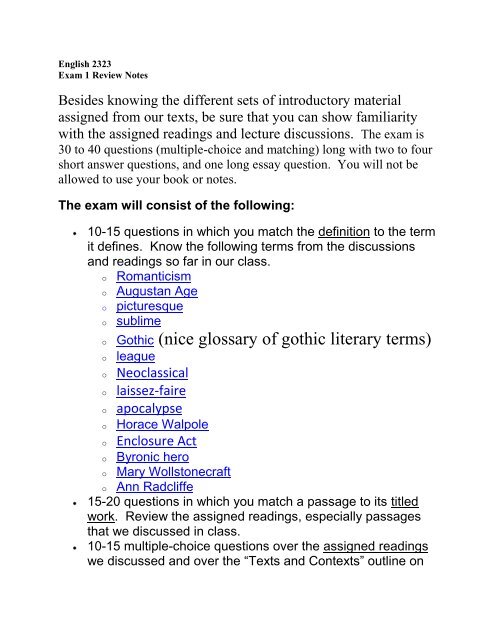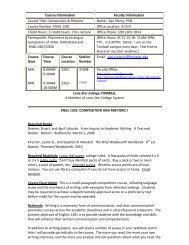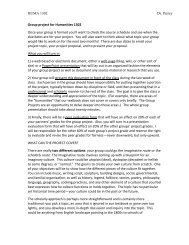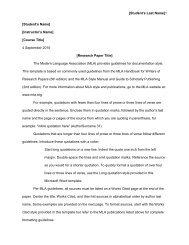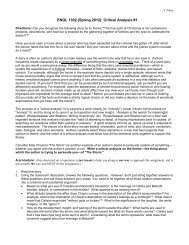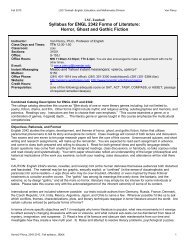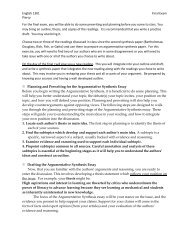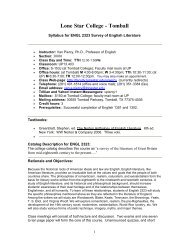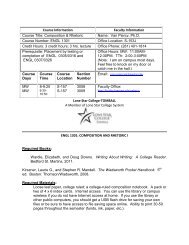English 2323 midterm review
English 2323 midterm review
English 2323 midterm review
You also want an ePaper? Increase the reach of your titles
YUMPU automatically turns print PDFs into web optimized ePapers that Google loves.
<strong>English</strong> <strong>2323</strong><br />
Exam 1 Review Notes<br />
Besides knowing the different sets of introductory material<br />
assigned from our texts, be sure that you can show familiarity<br />
with the assigned readings and lecture discussions. The exam is<br />
30 to 40 questions (multiple-choice and matching) long with two to four<br />
short answer questions, and one long essay question. You will not be<br />
allowed to use your book or notes.<br />
The exam will consist of the following:<br />
10-15 questions in which you match the definition to the term<br />
it defines. Know the following terms from the discussions<br />
and readings so far in our class.<br />
o Romanticism<br />
o Augustan Age<br />
o picturesque<br />
o sublime<br />
o<br />
o<br />
o<br />
o<br />
o<br />
o<br />
o<br />
Gothic (nice glossary of gothic literary terms)<br />
league<br />
Neoclassical<br />
laissez-faire<br />
apocalypse<br />
Horace Walpole<br />
Enclosure Act<br />
o Byronic hero<br />
o Mary Wollstonecraft<br />
o Ann Radcliffe<br />
15-20 questions in which you match a passage to its titled<br />
work. Review the assigned readings, especially passages<br />
that we discussed in class.<br />
10-15 multiple-choice questions over the assigned readings<br />
we discussed and over the “Texts and Contexts” outline on
pp. 23-25. You will need to be familiar enough with the tales<br />
we have read and the literary historical events we have<br />
covered to be able to answer questions without having the<br />
textbook in front of you. If we discussed a reading in class at<br />
any length, then it is safe to assume that it could be included<br />
on the exam.<br />
Three or four short answer questions (three to five<br />
sentences each).<br />
One short essay question that asks you for some<br />
analysis, synthesis, and evaluation over the assigned<br />
writings (250-500 words).<br />
Pay special attention to the major works in our syllabus, e.g.,<br />
Marriage of Heaven and Hell, The Prelude, or “Rime of the<br />
Ancient Mariner.” Know some of the key concerns and themes<br />
from the works that we have discussed in class. For the historical<br />
period, know some of the key social, economic, and technological<br />
events, especially from 1780 to 1830 (American and French<br />
Revolutions, Romantic period—see the “Introduction” of our<br />
textbook, pp. 1-22, and the “Texts and Contexts” outline on pp.<br />
23-25). Aside from the readings in our textbook, and especially<br />
the “biographical” or lead sections written up for the writers in our<br />
course, rely on any handouts in class, class discussion, and items<br />
on the class website.<br />
Sample essay and short answer questions:<br />
What is the meaning of the albatross in “The Rime of the Ancient<br />
Mariner”? Make a convincing case.<br />
What roles did the Bible play for Romantic writers? Use specific<br />
examples.
How does the representation of nature change between the<br />
eighteenth century and the Romantic period?<br />
Why would the phrase “natural supernaturalism” be appropriate to<br />
describe the concerns of Romantic writers?<br />
What is the function of nature in the poetry in the Romantic<br />
period?<br />
List and explain at least five characteristics of Romantic literature,<br />
and provide sufficient examples from the works of at least three<br />
poets.<br />
Describe the poetic theory propounded in the Preface to Lyrical<br />
Ballads. What made it appropriate to the Industrial Revolution?<br />
Discuss the role of architecture, with examples, in gothic fiction.<br />
Interpret the poem “Kubla Khan” based on the oppositions to be<br />
found in the poem.<br />
Explicate a passage (e.g., given these four to ten lines of poetry<br />
or prose—the lines will be provided in the exam—what can we<br />
say that they mean?).


